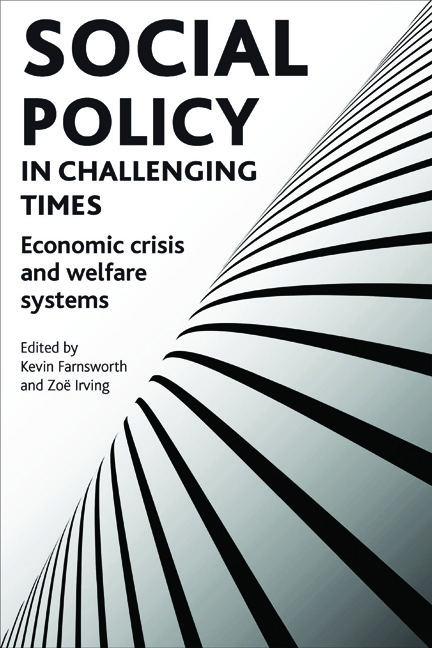Book contents
- Frontmatter
- Contents
- List of figures and tables
- Notes on contributors
- Acknowledgements
- one Varieties of crisis
- two The economic crisis and paradigm change
- three From financial crisis to fiscal crisis
- four Credit crunch, inequality and social policy
- five Global social policy responses to the economic crisis
- six Poverty, the crisis and social policy responses developing countries in developing countries
- seven South Korea after the 1997 economic crisis: a ‘paradigm shift’?
- eight China's response to crisis: what role for social policy?
- nine Tiptoeing through crisis? Re-evaluating the German social model in light of the global recession
- ten Ireland and the impact of the economic crisis: upholding the dominant policy paradigm
- eleven Waving not drowning: Iceland, kreppan and alternative social policy futures
- twelve Experiences from two financial crises in the Nordic welfare states: 1990-93 and 2008-10 compared
- thirteen Social policy and the recent economic crisis in Canada and the United States
- fourteen From economic crisis to a new age of austerity: the UK
- fifteen Responding to the challenges: some concluding remarks on welfare futures in changed circumstances
- Bibliography
- Index
fifteen - Responding to the challenges: some concluding remarks on welfare futures in changed circumstances
Published online by Cambridge University Press: 07 September 2022
- Frontmatter
- Contents
- List of figures and tables
- Notes on contributors
- Acknowledgements
- one Varieties of crisis
- two The economic crisis and paradigm change
- three From financial crisis to fiscal crisis
- four Credit crunch, inequality and social policy
- five Global social policy responses to the economic crisis
- six Poverty, the crisis and social policy responses developing countries in developing countries
- seven South Korea after the 1997 economic crisis: a ‘paradigm shift’?
- eight China's response to crisis: what role for social policy?
- nine Tiptoeing through crisis? Re-evaluating the German social model in light of the global recession
- ten Ireland and the impact of the economic crisis: upholding the dominant policy paradigm
- eleven Waving not drowning: Iceland, kreppan and alternative social policy futures
- twelve Experiences from two financial crises in the Nordic welfare states: 1990-93 and 2008-10 compared
- thirteen Social policy and the recent economic crisis in Canada and the United States
- fourteen From economic crisis to a new age of austerity: the UK
- fifteen Responding to the challenges: some concluding remarks on welfare futures in changed circumstances
- Bibliography
- Index
Summary
The opening chapter to this volume drew attention to the significance of variance in understanding the nature and impact of the financial crisis that began in the United States (US) in 2007 and went ‘global’ in 2008. This theme was evident at the workshop held in 2009 that initially inspired this book, where optimists pointed to the opportunities for challenging failed neoliberal models of capitalism, which seemed to be surfacing in a range of contexts, and to the possibilities for pursuing more progressive welfarist agendas. Pessimists argued that the crisis would only squeeze welfare systems still further, making them less tenable in the future. With the benefit of some hindsight, gained over the period during which the chapters have been developed, it appears that both positions have been borne out, but not necessarily in the ways anticipated. What emerges from the analyses included here is a complexity of national outcomes, transnational relationships and global processes that remains as unpredictable as it is fluid. The crisis was global in the sense that its impact was felt in almost every country and the response to it involved multilateral engagement to a degree that has not been seen since the Second World War. But in terms of its impact on nation states and its implications for social policy, the global crisis can best be understood as related national crises, and although multilateralism of a sort was promised, entrenched national and economic interests have ascended at the expense of full international cooperation, and new differences and divisions have been created between states.
In coming to terms with the crisis, and subsequently understanding national crises then, what can assist in making sense of this complexity of changed circumstance? Drawing from a range of policy studies literatures (historical institutionalist, varieties of capitalism, welfare regimes, policy networks), all the contributions here demonstrate that the centrality of politics is manifest in explaining both the changed circumstance and the varieties of crisis. However, while all these theoretical frameworks would suggest that given their political and institutional differences, welfare systems would fare differently as a result of the crisis, none has completely reliable predictive capacity because the causes of specific crises reflect much more the differences rather than the similarities between states.
- Type
- Chapter
- Information
- Social Policy in Challenging TimesEconomic Crisis and Welfare Systems, pp. 271 - 278Publisher: Bristol University PressPrint publication year: 2011



